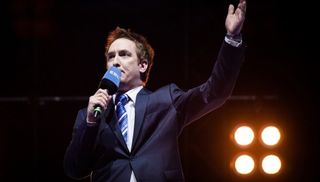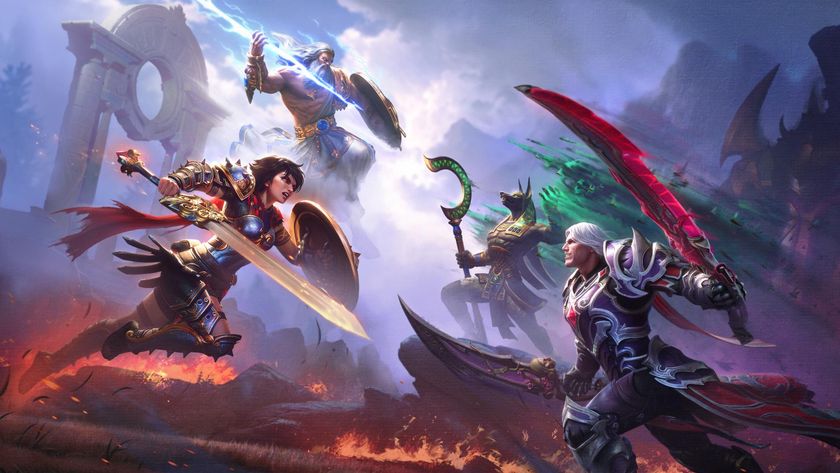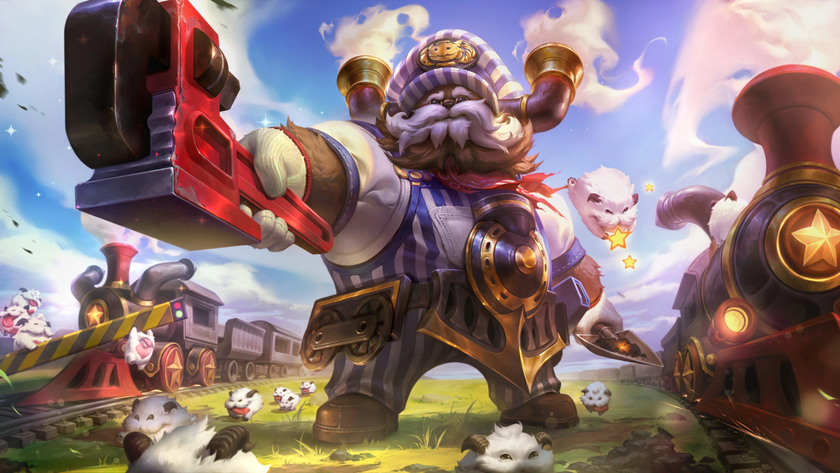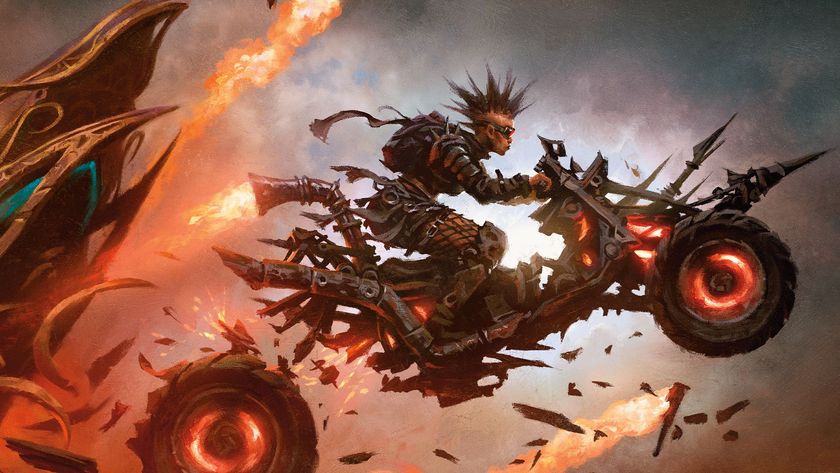Paul 'ReDeYe' Chaloner talks ESL One Frankfurt, casting, and the future of e-sports

Paul 'ReDeYe' Chaloner has been involved in e-sports for fifteen years as a shoutcaster, host, and presenter. He's seen every part of the business, from amateur bedroom casting to addressing thousands of people on stage. Next week, he'll be hosting his first Dota 2 tournament— ESL One Frankfurt . Earlier in the week I spoke to Paul about his expectations for the tournament, how he goes about preparing for an event this big, and how the business of presenting e-sports has changed over the years.
In the run up to presenting something like ESL One, what do you do?
As a host, as I am at ESL One, it starts weeks before, sometimes months before. ESL One for me started back in March. The reason is because I've never done Dota 2 before. It starts with playing the game, understanding the mechanics, the heroes. Generally getting a good feel for the game. I guess I've probably put in about eighty hours of gameplay since March, which is enough to give me a reasonable base of understanding. Alongside that is drenching myself in the community. Understanding the funny stuff, understanding the memes that they use.
Every community is very different. Starcraft is quite intellectual, while the Dota community is much more fun. You really need to be in tune with that. With Dota, it's really important to me that I'm connected to the crowd and the people back at home and I understand what they want from the show. I've found that to be part of a winning formula for hosting well at shows. ESL One's no different.
What stories are you looking forward to see play out at ESL One, given that this is the last big tournament before TI4?
Well we've got all three previous International winners and that's a storyline in its own right. iG are looking pretty strong right now but Na'Vi and Alliance—they're the big names but they've not been playing much and when they have been playing they've not been playing that well. For me it's intruiging whether the five that have not got an International title to their name, can they step up a few weeks before TI4 and give these guys something to think about? What does that do to them, going into TI? If Alliance win this at a canter, what signal does that send to everyone else? If they don't win it, and they crash out in the quarters, what signal does that send to them about how much harder they're going to have to work?
If Dendi reaches the semi-final—this a smaller, personal story—he'll become the highest-earning player in the world. He's currently third, but he's only a few thousand short. He'll become the most successful e-sports player of all time, two weeks before TI4 which will then change all that. It's ironic, really.
The biggest gaming news, reviews and hardware deals
Keep up to date with the most important stories and the best deals, as picked by the PC Gamer team.
Providing that he gets to second place in the International again, he'll probably be fine.
He might well be the first guy to go over a million, as well. We look for stories like that—we've got a ton of them, but those are the key ones for me. The big ones.
E-sports presenting requires increasingly more professionalism and craft, but people still come into it through the hobby—from their bedrooms. Do you think that will change?
I think so. If you look at the early days of football on TV and radio, they struggled—they'd often grab someone who had a good voice or who just loved the game. Murray Walker for instance started in motorbike racing and went to Brands Hatch every weekend to do some commentary from the track. I see some parallels in e-sports. In the last 10-12 years we've got some people who have come from where I was, bedroom shoutcasting, but now we've also got Twitch which more like bedroom TV. That helps them an awful lot, but the entry level is still very low. Not every tournament has the means to pay people and because of that you end up with a potentially lower level of professionalism.
A lot of the guys that come in now get thrown in at the deep end. I was very lucky—I had a few years of doing bedroom shoutcasting and a few years of doing video to, er, not many people. These guys get thrown in on a giant tournament and it's their first time and they go out to 150,000 people and mistakes are very big in that environment. I think it's nice that the entry level is low but it does mean that we're still growing.
If you look at sports on TV right now there are a lot more presenters that have come from professional TV backgrounds. We're on that road, and I suppose my fear as an e-sports person is that we either step up or make way for the pros. We either need to help everyone get up to a good level or eventually when events have enough money they're just going to replace us with professional talent. I don't mind that so much—you get the professionalism—but I'd much rather have the people that are passionate about their game.
What's your feeling about the vast amount of money in Dota 2 this year? What are the ramifications not just for Dota, but for e-sports in general?
I think we have to wait another year before we figure out what it does to the landscape, but overall its a good thing. It's a sea change in how tournaments can fund themselves, because the majority of the money has come from us. It'd be interesting to see how that falls.
If somebody is trying to break into casting—doing the squirrel-league stuff—is there anything that people regularly get wrong that they could fix to move up a bracket?
This will sound really harsh, but the biggest problem is that most people see the low entry level and think "yeah, I could do that". In their head, it's like singing in the shower. I like singing in the shower and in my head I sound quite good—but if I was to sing publicly people would be crying and asking me to leave the area. Shoutcasting is like that. In your head, you think "I would have said this, or what was this guy talking about, he's talking rubbish." After a while you feel compelled to try it—you're probably quite good at it!
The problem is that 90% of the people who go onto Twitch or start up an audio channel have the passion—they absolutely have the passion—and love their game, but don't have the voice or personality to be able to project properly and entertain someone. What they do is maybe too in-depth.
As a play-by-play commentator, your number one job is to grab someone by the balls, hurl them in and make them love what they're watching. That would be my number one thing. Sometimes, people unfortunately aren't born with the right voice or the right personality to be able to do that. They're very good at knowledge, they're very passionate, but they're unable to project that via a microphone. It's the harshest feedback I can give someone, but I'm always very blunt and honest with people.
I think you can work on other aspects—you can be phenomenally good at nine or ten of the other skills that you need that may make up for it, but it's very rare.
Joining in 2011, Chris made his start with PC Gamer turning beautiful trees into magazines, first as a writer and later as deputy editor. Once PCG's reluctant MMO champion , his discovery of Dota 2 in 2012 led him to much darker, stranger places. In 2015, Chris became the editor of PC Gamer Pro, overseeing our online coverage of competitive gaming and esports. He left in 2017, and can be now found making games and recording the Crate & Crowbar podcast.
Most Popular









